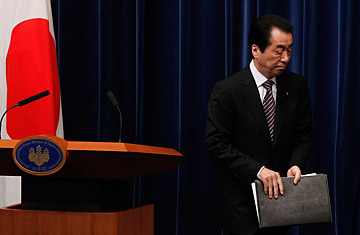
Japan's Prime Minister Naoto Kan leaves a news conference announcing his resignation at his official residence in Tokyo on August 26, 2011.
Japanese Prime Minister Naoto Kan announced on Friday his long-expected resignation after almost 15 months in office following accusations that he fumbled his government's response to the March 11 tsunami disaster and nuclear crisis. His support rating had reached below the critical 20% mark.
Kan's premiership had effectively ended in June when he survived his government's no-confidence motion by promising to quit. He had agreed to step down after Parliament passed key pieces of legislation — one on the budget and two that would compel the nation's utilities to buy renewable energies such as solar and wind power. The final two bills were passed on Friday, becoming the official kickoff for the leadership race. "Under the severe circumstances, I feel I've done everything that I can do," said Kan, 64, in a nationally televised speech. "Now I would like to see you choose someone respectable as a new prime minister."
Candidates to replace Kan as chief of the ruling Democratic Party of Japan (DPJ) have already been jockeying for position. His successor will almost certainly become Japan's next prime minister, the country's sixth in five years.
The front-runner is former foreign minister Seiji Maehara, 49, known as a foreign policy hawk. But the political donation scandal that forced him to resign in March may tarnish his position and open the floor to other likely contenders such as Finance Minister Yoshihiko Noda, 54 and Trade Minister Banri Kaieda, 62. A party-wide vote to decide the next party leader will be made on Monday with the new leader appointed as prime minister on Tuesday.
Whoever replaces Kan will face formidable challenges, including the biggest reconstruction effort since World War II, a national debt twice the size of the nation's economy, a soaring yen weakening the country's export-led economy, an aging population, and continued radiation leakage at the Fukushima nuclear power plant. Since the March disaster, 80,000 people have been evacuated from around the plant and tens of thousands remain in either evacuation centers or temporary housing.
A divided parliament is yet another contentious issue. Political infighting between the ruling and opposition parties has been blamed for much of the lack of inertia on decision-making and political merry-go-round of Japanese leaders. The idea of a grand coalition has been proposed to end the blockage of important bills and continued stifling conflicts.
Two years ago, the left-of-center DPJ ended the almost continuous 50-year rule by the conservative Liberal Democratic Party. There was much hope that the fresh, new leadership would bring needed change. But voters have criticized the party's lack of follow through on pledges, including a major shift in spending on key issues such as health, education and social services.
In July, the Prime Minister shocked his party colleagues when he promoted a future energy policy away from its present nuclear dominance towards renewables, specifically citing solar energy. This immediately put him at odds with party conservatives and the nation's powerful nuclear business lobby. He later added that the statement was a personal preference and not party policy. However, public support for a gradual nuclear power phase out has been growing. "I hope to see this party become one, where everyone from the young to the veterans can discuss actively and freely, then cooperate and act as one," said Kan.
A united party may also be needed to help ease tensions between Japan and the U.S. over its military base in Okinawa. The prime minister's successor will be key to that effort. Kan's visit with U.S. President Barack Obama, planned for September, was cancelled due to the political uncertainty.
